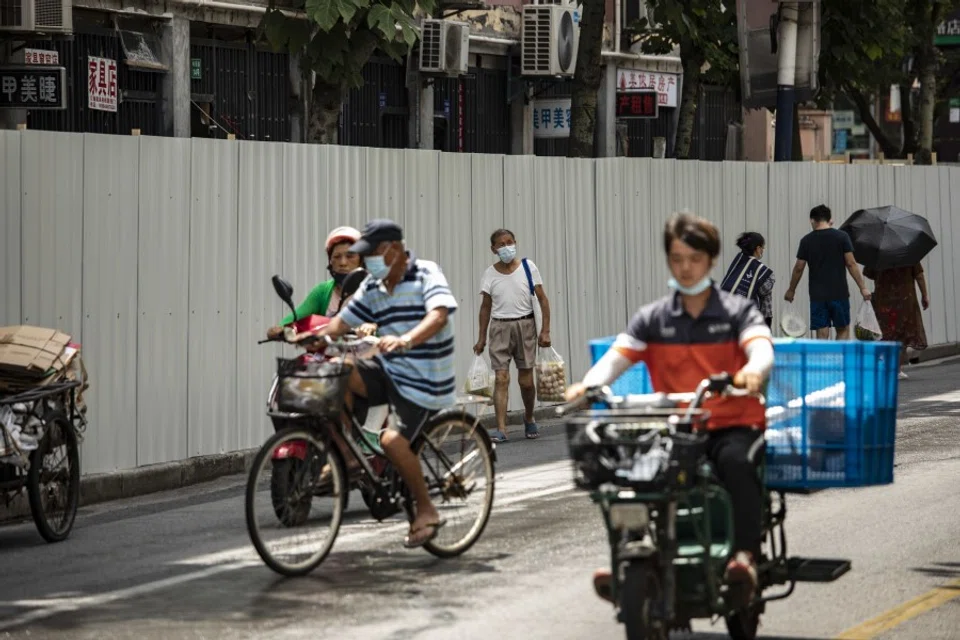Japanese researcher: China's zero-Covid policy and prospects for the Chinese economy
The impact of the Shanghai lockdown is far-reaching, not least the way it is weakening Chinese exports and consumption, which have helped China weather the economic storm thus far, says Japanese researcher Toshiya Tsugami. This is having ripple effects on global supply chains and may further debilitate them before they have a chance to normalise. To stave off a severe economic crisis, China must deal with three pressing issues.

Shanghai's lockdown to stem the rise in Omicron variant Covid-19 cases was lifted on 1 June. The impact of the two-month lockdown has been severe, not only in Shanghai but also the Yangtze Delta region, including Jiangsu and Zhejiang provinces. For one, the economic losses suffered from bringing this region at the heart of the Chinese economy to a standstill have been considerable.
Harsh real estate tightening policies effected over two years ago have pushed the real estate industry into a deep recession. Real estate investment and home sales, which are said to account for one-fourth of GDP both directly and indirectly, fell by 20-40% year-on-year. Even so, thanks to relatively strong consumption and exports, the Chinese economy was able to maintain 4% growth even in the fourth quarter of last year. But this time, Chinese exports and consumption have been hit by the lockdown. The impact of this situation started to make its presence felt in March when a lockdown was imposed in Shenzhen. This became even more acute when the Shanghai area was put under lockdown in April.
When it comes to meeting this year's annual growth target of 5.5%, the warning lights are already blinking.

Statistics for the second quarter are not yet available, but a look at Purchasing Managers' Index (PMI) data shows a similar trend to the first quarter in 2020, which recorded a negative growth of 6.8% year-on-year, triggered by the pandemic. Even if it will not fall as much as it did two years ago, figures for the second quarter might hit zero growth and eventually negative growth. When it comes to meeting this year's annual growth target of 5.5%, the warning lights are already blinking.
... it appears that China's harsh lockdown policy along with the Ukraine war will further accelerate the decoupling of the world economy.
This impact is not limited to China. As a result of the major disruption of logistics at the Shanghai container port, the largest in the world, global supply chains have been affected. In Japan, as a result of the disruption of component deliveries from China, manufacturers of products like automobiles, home appliances and IT equipment have been forced to cut down on their operations and make adjustments to procurement. Delivery dates for consumer products have inevitably been pushed back.
Over the past two years, the US-China confrontation, the Covid-19 pandemic and other events have highlighted risks to global supply chains, yet it appears that China's harsh lockdown policy along with the Ukraine war will further accelerate the decoupling of the world economy.

Economic headwinds ahead
China's Omicron variant epidemic is under control, but there are three challenges ahead for the Chinese economy.
If we cannot hope for a self-sustained recovery, there will be a need for economic stimulus measures, but that is also where the second hurdle lies - severely strained public finances.
The biggest risk is that Covid infections will rise again. The experience of various countries has been that once restrictions are relaxed, the next wave of infections ensues within a few months. If there is a resurgence in major cities such as Shanghai and Beijing and lockdowns are put in place again, the measures will have a large impact on the recovery in consumption. The normalisation of logistics and supply chains, which is expected over the summer, will be impacted and the delay will have a prolonged impact on the global economy if the next wave of infections hits before then.
If we cannot hope for a self-sustained recovery, there will be a need for economic stimulus measures, but that is also where the second hurdle lies - severely strained public finances. A simple calculation of the cumulative total of national general public budget revenue in January to May gives a 10.1% year-on-year decrease, which is an unprecedented decline. With major tax cuts having already been made this year, the value-added tax revenue, the largest source of revenue, has dropped by 43.4% based on a simple calculation. The economy is still in a bad shape even after those massive tax cuts, and there is limited room for further fiscal stimulation.

Local government finances have faced much more severe constraints due to overinvestment and excessive debt over the past decade. This year, in order to stimulate the economy, quotas for local "special bonds" (special local government bonds) for infrastructure development have been distributed ahead of schedule, but as a result of the severe real estate recession, state-owned land leasing revenue, which accounts for 30% of the total revenue of local governments, has dropped by 28.7% in the cumulative total for January to May. As a result of this sharp decline, local government finances will face a predicament in the second half of the year.
If China's economy is to improve in the short term, the only way would be to "reinvigorate" the real estate economy.
The third hurdle is real estate. According to the statistics for May, floor area sold for residential real estate remains dismal, dropping by 28.1% in January to May and 36.6% in just May, while newly constructed floor area dropped by 31.9% in January to May and 41.3% in May alone. If China's economy is to improve in the short term, the only way would be to "reinvigorate" the real estate economy. If the government changes the "housing is for living in, not speculation" policy that it has adhered to for the past few years, the dark clouds covering the real estate industry and the market will soon be lifted, but it is equally certain that the real estate bubble and the debt overhang problem will reignite, thus committing the folly of "drinking poison to quench thirst."
In my opinion, the only way to avoid triggering a serious economic crisis in the future is to accept a decline in growth for the time being, although it is inevitable that this will hurt not only China but also the world economy. It is also set to send ripples at the 20th Party Congress of the Chinese Communist Party, which is coming up this fall.
Related: Post-lockdown Shanghai is as tense as ever | Many want out as Shanghai recovers from lockdown | Can Shanghai meet its zero-Covid deadline and resume production? | Best of both worlds: China wants both zero-Covid and economic growth | Why China's economists and entrepreneurs are keeping mum about the economy | It takes a mountain of effort to tell the truth about China's economy



![[Photos] Fact versus fiction: The portrayal of WWII anti-Japanese martyrs in Taiwan](https://cassette.sphdigital.com.sg/image/thinkchina/3494f8bd481870f7c65b881fd21a3fd733f573f23232376e39c532a2c7593cbc)

